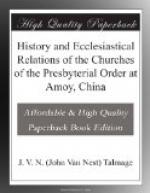The decision of the last Synod may not be the result of sectarianism among the people of our Church. We do not think it is. But it will be difficult to convince our Presbyterian brethren and others, that it is not so. By way of illustration I will suppose a case. A. is engaged in a very excellent work. B. comes to him, and the following dialogue ensues:
B. “Friend A., I am glad to see you engaged in so excellent a work. I also have concluded to engage in it. I should be glad to work with you. You know the proverbs, ‘Union is strength,’ and ’Two are better than one.’”
A. “Yes, yes, friend B, I know these proverbs and believe them as thoroughly as you do. But I have a few peculiarities about my way of working. They are not many, and they are not essential, but I think they are useful, and wish to work according to them. Therefore, I prefer working alone.”
B. “Yes, friend A., we all have our peculiarities, and, if they be not carried too far, they may all be made useful. I have been making inquiries about yours, and I am glad to find they are not nearly so many, or so different from mine, as you seem to suppose, and as I once supposed. The fact is, I rather like some of them, and, though I may not esteem them all so highly as you do, still I am willing to conform to them; for I am fully persuaded that, in work of this kind, two working together can do vastly more than two working separately, and the work will be much better done. Besides this, the social intercourse will be delightful.”
A. “I appreciate, friend B., your politeness, and am well aware that all you say about the greater efficiency and excellence of united work, and the delights of social intercourse is perfectly true. But—but—well, I prefer to work alone.”
2. It will be destroying a real unity for the sake of creating one, which, at the best, can be only nominal, and hence will really be a violation of Presbyterial order. It seems strange to us that it should be constantly asserted that we are striving to create a formal union between two bodies which are essentially distinct. There is nothing of the kind. There are six organized churches at Amoy. They are all Dutch (i.e. Reformed), and they are all Presbyterian, for the Dutch Churches are all Presbyterian. But they are Chinese, not American, nor English, nor Scotch. If these churches are not one, then it is impossible for two or more individual churches to be one. If schism in a Church be a sin, then the separation of this Church will be a sin, for it will be an actual schism. You can make nothing more nor less of it. If you say that schism is only an evil, then the separation of this Church will, at least, be an evil.




